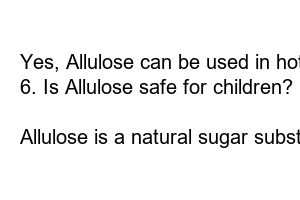알룰로스 부작용
Title: Allulose Side Effects: Debunking Common Misconceptions
Introduction:
When it comes to healthy sugar substitutes, Allulose is gaining popularity for its low calorie content and sweet taste. However, as with any food additive, there are concerns about potential side effects. In this blog post, we will explore the facts surrounding Allulose and its side effects.
1. What is Allulose?
Allulose is a natural sugar found in small quantities in certain foods. It is a monosaccharide that resembles glucose but is only absorbed by the body in minimal amounts, making it virtually calorie-free.
2. Digestive Side Effects
While Allulose is generally well-tolerated, some people may experience digestive discomfort such as bloating, gas, or diarrhea when consumed in excessive amounts. However, these side effects are generally mild and subside on their own without any long-term complications.
3. Impact on Blood Sugar Levels
Unlike regular sugar, Allulose does not significantly raise blood sugar levels because it is not fully metabolized by the body. This makes it an excellent option for individuals with diabetes or those following a low-carb or ketogenic diet.
4. Potential Laxative Effect
Due to the incomplete absorption of Allulose in the body, some individuals may experience a laxative effect when consuming large quantities. As with any sweeteners, moderation is key to avoid unpleasant consequences.
5. Allergy Concerns
Allulose is considered safe for most individuals; however, some rare cases of allergic reactions have been reported. If you notice any symptoms such as rash, itching, or swelling after consuming Allulose, it is advisable to consult a healthcare professional.
6. Impact on Gut Health
Studies suggest that Allulose may have a positive impact on gut health by promoting the growth of beneficial bacteria. This is beneficial for overall digestive health and may support a healthy immune system.
Frequently Asked Questions (FAQs):
1. Is Allulose safe for consumption?
Yes, Allulose is generally safe for consumption. However, it is recommended to consume it in moderation and consult with a healthcare professional if you have any underlying medical conditions.
2. Can Allulose be used as a replacement for sugar in baking?
Yes, Allulose can be used as a sugar substitute in baking. It provides the sweetness of sugar without the added calories.
3. Does Allulose have an aftertaste?
Allulose has a taste similar to regular sugar and does not have a noticeable aftertaste.
4. Can Allulose be consumed by individuals with diabetes?
Yes, Allulose is a suitable option for individuals with diabetes as it does not significantly impact blood sugar levels.
5. Can Allulose be used in hot beverages?
Yes, Allulose can be used in hot beverages such as coffee or tea. It dissolves easily and provides sweetness without altering the taste.
6. Is Allulose safe for children?
Allulose can be safely consumed by children. However, it is always advisable to consult with a healthcare professional before introducing any new food to their diet.
Summary:
Allulose is a natural sugar substitute that offers sweet taste with minimal calorie impact. Although it may cause mild digestive issues when consumed in excess, it is generally safe for most individuals, including those with diabetes. With its potential benefits for gut health, Allulose can be a valuable addition to a balanced diet. Remember, moderation is key when incorporating any new food additive into your routine.

